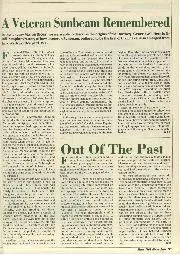
A veteran Sunbeam remembered
In the January Motor Sport, we were able to describe the origins of the Darracq "Genevieve". Here is Dr Bill Pumphrey's story of how a veteran Sunbeam, believed to be…
CIRCLIFI’ IMPROVEMENTS PRE-WAR
As I set the questions kindly answered for Mo.rok SPoirr by race-organisers last month, I am writing myself a letter to show John Eason Gibson that he is to some extent wide of the mark in saying improvements were not made at Brooklands every winter. Confining myself to the years between the wars and summarising from my ” History of Brooklands Motor Course,” we have :
Apart from the repairs referred to, the 3 -mile -too-ft. banked Track was patched up every zvinter a far bigger task, I suggest, than repairing present-day circuits, with their tarmac roads on old runways or perimeter tracks, temporary canvascovered stands, and often an uncovered Paddock. Mr. LockeKing built Brooklands at a cost, by today’s currency, of some Li-million, and that it scarcely paid its way is not surprising, remembering the large permanent staff of officials, office workers, gate-keepers, carpenters’ gardeners, painters, etc., who had to be retained in order to keep this enormous estate tidy. Before ever a race was run (over half a century ago!) there was a tunnel under the Track and a bridge over it, and a concrete Paddock with 75 covered stalls. It is not so long ago that one couldn’t get into or out of Goodwood from the Paddock while racing was in progress (you still can’t at Silverstone or Snetterton) and the Paddock was frequently a quagmire. Even today there are no covered bays in the Silverstone Paddock, nor are there at Aintree, Oulton Park or Snetterton. I suppose the public can telephone from Silverstone, they can at Aintree, but can they at Snetterton, Goodwood or Oulton Park ? Brooklands was open every day, you could eat there, fly there, buy petrol, weigh your car, put it under cover, dance there in the ‘twenties, play tennis there before 1914 . . .
It is significant that, in spite of the enormous post-war interest in motor racing, there is no circuit in England where the Trade can rent premises (apart from the new sheds at Brands I-latch), enthusiasts drop in any day for a meal, the petrol, oil, tyre and accessory people leave their supplies between one meeting and the next. . . .
Let’s not cast aspersions at dear old derelict Brooklands!
Fleet. W. Bono”’. [If the above has taken up considerable space at least the annual data may serve those trying to ” date ” correctly old Brooklands films and photographs.—Eu.1